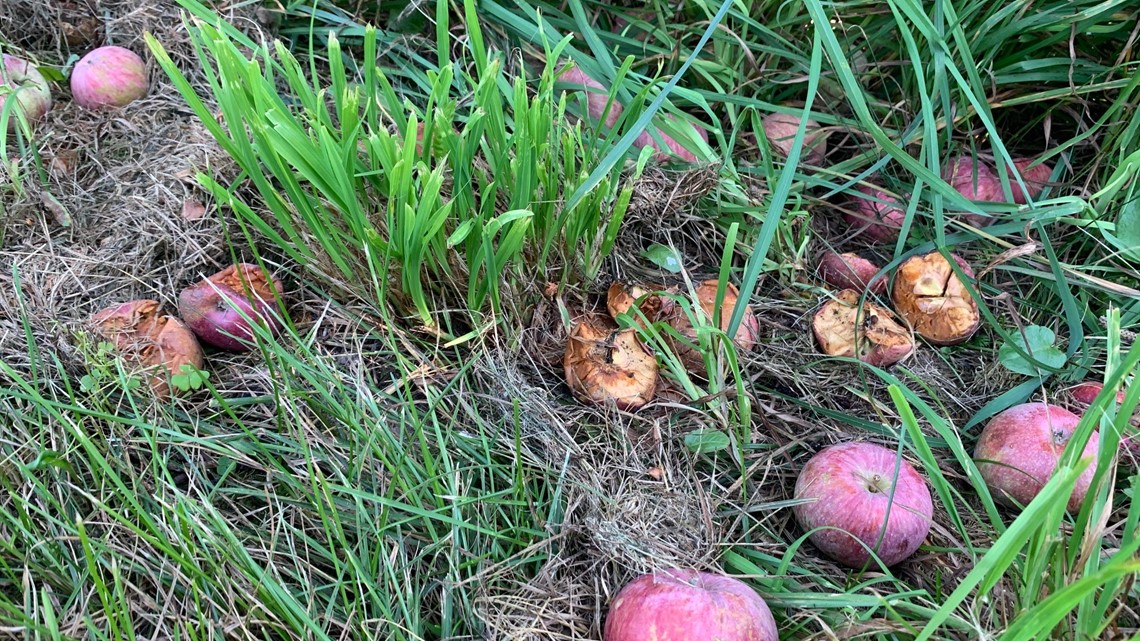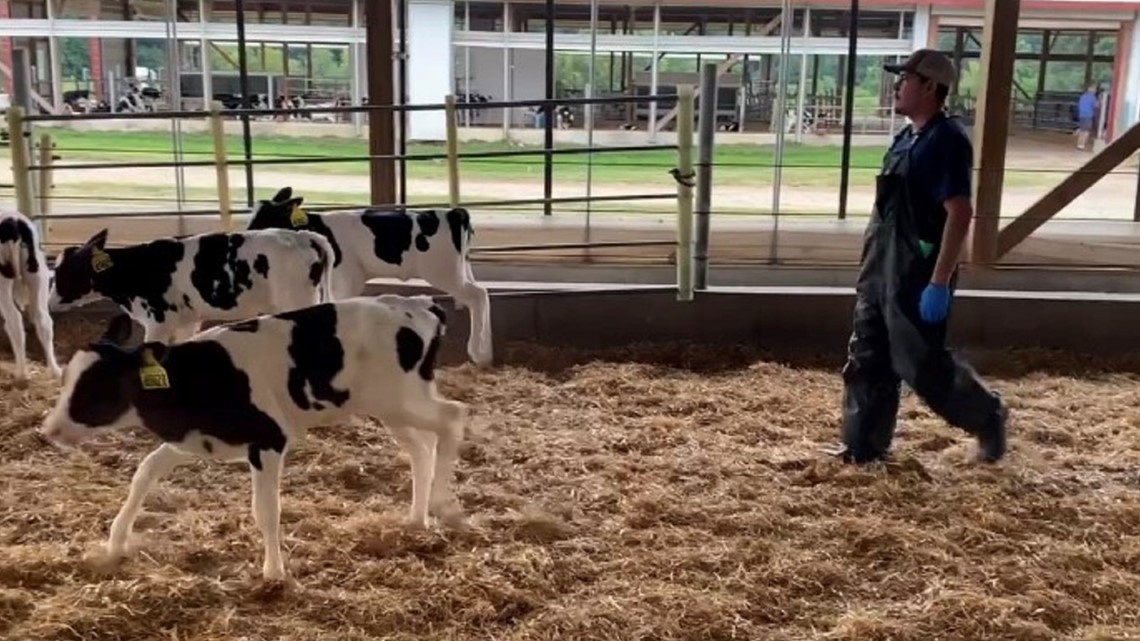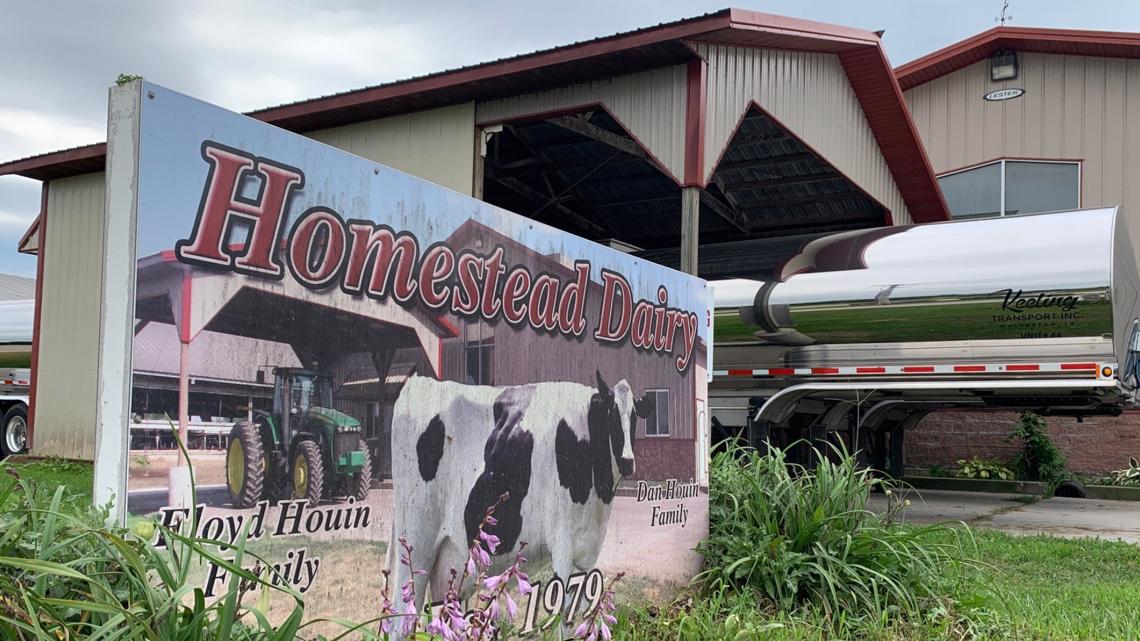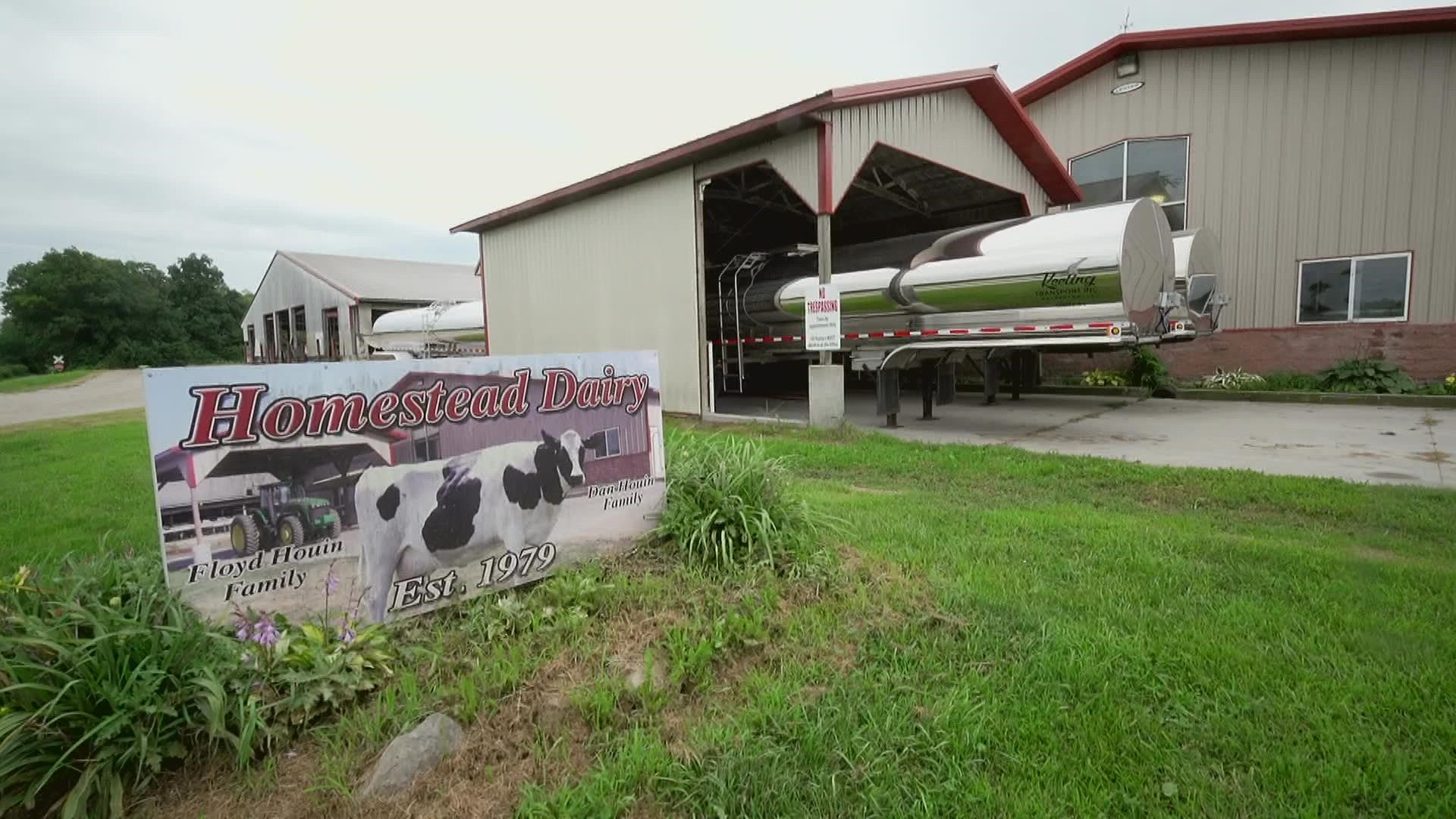PLYMOUTH, Indiana — If you buy a gallon a milk at an Indiana Walmart, it likely comes from a cow at Homestead Dairy.
The farm, located two hours north of Indianapolis, is home to about 5,000 dairy cows – and every one of them needs to be milked three times a day. That requires dozens of employees, but finding folks to work on dairy farms has not been easy.
“We have posted in newspapers from South Bend all the way to Rochester saying we need workers, and we didn’t get any,” said Jill Houin, whose family runs the fourth-generation dairy. “Getting people has been difficult over the last few years. If you don’t have workers, you don’t have milk.”
The reality is most Hoosiers don’t want to work on dairy farms, where long days involving very physical work requires a passion for the industry.
That’s why 70% of the staff at Homestead Dairy come from foreign countries. Most of the milkers, veterinarians, mechanical engineers and barn caretakers who keep the dairy running are from Mexico. Houin says based on experience, the staff earn between $48,000 and $90,000 annually, which includes housing.
“These immigrants that are coming over with visas and different things like that allow us to produce the milk,” Houin told 13News. “They are crucial to our business, and they have become part of our family.”


The regulations and immigration laws that allow American farms to bring in foreign workers have been around for decades, and they are very strict, limiting the number of immigrants who fill agriculture jobs and the months they can provide their services.
It means many farms that heavily rely on migrant labor – such as fruit, dairy and poultry farms – struggle to find the staff they need.
That struggle has consequences.
This week, thousands of ripe Macintosh apples rotted on the ground at Earth First Farms, an organic farm located 20 miles north of South Bend, as the farm waited for a crew of migrant workers to arrive to harvest the crop.
“We’re hoping to see them this week,” said owner Tom Rosenfeld. “There just aren’t enough to go around.”


“Some of these crops are still very labor intensive, particularly specialty crops, and it is a challenge to find enough labor,” said Bruce Kettler, director of the Indiana Department of Agriculture. “It puts a lot of pressure on farmers and their bottom line.”
Lost product and increased labor costs translate to higher prices at the grocery store.
In the past two years, the cost of milk in Indiana has increased 30%. And without migrant workers, retail milk prices would double, according to Steve Obert, executive director of Indiana Dairy Producers. He said immigrant labor is responsible for milking nearly 80% of cows that supply the nation’s milk.
“We all know about rising food costs, and labor is an important part of that,” Kettler explained. “I hear about it almost every day. Our farmers need help to access more labor.”
Legislation pending in Congress
The help that Kettler and farmers are talking about is federal legislation called the Farm Workforce Modernization Act.
The bill calls for a major update to the nation’s immigration rules for migrant farm workers and would allow more U.S. farmers to hire immigrant workers year-round. The current system favors seasonal work visas that allow workers to pick specialty crops for several months at a time. Those visas are not much help to Indiana’s dairy and poultry industry because year-round employers cannot use the seasonal worker visa system, known as the H-2A temporary agricultural program.
“Cows milk year-round, 12 months a year,” said Houin. “Immigration reform is so important because we need ways to be able to bring in labor so we can do it properly.”


The U.S. House of Representatives passed the FWMA in early 2021 with bipartisan support. The fate of the bill now rests in the Senate, where votes from Indiana Senators Todd Young and Mike Braun could be crucial.
This summer, Kettler sent a letter to both of Indiana’s U.S. senators, requesting their support for the legislation.
“I firmly believe the Act will go far in securing a stable workforce, while alleviating supply chain issues and rising food prices,” Kettler wrote, adding that passage of the bill would be “transformational” for Indiana dairy and poultry farmers in their efforts to attract enough year-round workers.
Young and Braun have also heard from every major agriculture organization in the state. Leaders from the Indiana Farm Bureau, Indiana Dairy Producers, Indiana Beef Cattle Association, Indiana Vegetable Growers Association, Indiana Corn Growers Association, Indiana Soybean Alliance and Indiana State Poultry Association signed a separate letter to Indiana’s senators, urging them to approve the FWMA.
“We are asking your support … to improve current guest worker laws and help Indiana farmers which are in desperate need of a well-trained, stable workforce,” they wrote. “Now is the time to fix our broken system. Currently, Indiana agriculture is experiencing a magnitude of difficulties staffing our farms. The work of caring for animals, milking cows, picking our fruits and vegetables is increasingly being done by an immigrant workforce. The pandemic has placed a serious strain on our food production system, but it was immigrant workers who proved to be essential by showing up to work every day.”
Behind the scenes, senators have been trying to draft their own version of the FWMA, but finding compromise during a highly-politicized election year might be hard to achieve.
Indiana senators making no promises
Both Indiana senators have been traveling the state and talking with farmers. Both have been tweeting concerns about rising food costs impacting Hoosiers. And both are hesitant to say whether they will vote in favor of immigration reform to help Indiana farmers.


Senator Todd Young’s office told 13News, “Senator Young will review the bill text once it has been introduced in the Senate for consideration, so we’re going to hold off on weighing in for now. Sen. Young has heard from farmers around the state regarding labor shortage concerns, and knows it is top of mind.”
Sen. Braun says he is hearing the same concerns.
“I was talking to a dairy farmer, [who said hiring is] almost impossible. They’ve got some positions they haven’t been able to fill in over a year or so,” the senator told 13News at a meeting with state agriculture leaders. “Ag is coping with the labor shortage more than any other segment of our economy.”
Braun says he is sympathetic to the labor shortage on farms, but he acknowledges the FWMA faces opposition from his conservative Senate colleagues who have concerns about immigration.
“This bill, along with the whole border discussion, immediately gets tied into border security,” Braun said. “I’m going to look at it. Generally, when these bills get ready for a vote, there’s other stuff in it you may not like, but I’m definitely going to be open to it.”
The state’s director of agriculture says lawmakers should not confuse illegal border crossings with a highly-regulated, legal system that attracts skilled foreign workers to American farms.
“There’s a huge difference between illegal immigration versus the legal immigration process,” Kettler said. “In the farm community, what we’re talking about is a legal process that’s already been in place. Farmers want to do things right, and they want to be able to do it legally.”
“This is not amnesty! Improperly documented workers would be required to pay a penalty before receiving a certified ag worker visa,” added Obert, the Indiana Dairy Producers executive director and an Evansville dairy farmer. “For those wanting solutions to border security, this legislation requires e-verify filing of new hires. Ag employers will be doing their part to keep our nation secure and our food supply secure.”


But the bill remains politically charged, largely due to perceptions about immigration. The political divide was evident when House lawmakers approved the FWMA in 2021. At that time, Indiana’s two Democratic representatives both voted in favor of the bill, while six of seven Republican lawmakers voted against it. (Republican Rep. James Baird, whose district covers a large section of farmland in west central Indiana, was the only member of Indiana’s Republican caucus to support the bill.)
Another hurdle is a provision in the proposed law that would extend protections to more migrant workers under the Migrant and Seasonal Agriculture Workers Protections Act. Some Republican lawmakers worry that allowing migrant workers with seasonal work visas to file lawsuits against employers who violate farm labor laws would lead to frivolous lawsuits.
State agriculture leaders urged Young and Braun to not allow the FWMA to get caught up in politics when they wrote to seek the lawmakers’ support.
“Our organizations fully understand the difficult political nature that immigration reform presents to our elected officials, however, any consideration and support for legislation that offers earned legalization to our current workers and immediate family and gives farm families access to a functional guest worker program going forward would be appreciated,” they wrote.
Farmer pleas continue
A year later, those same leaders continue to advocate for a new farm workforce law. At a recent roundtable discussion hosted by the Indiana Farm Bureau, the main topic of conversation was the FWMA and its impact on farming and the state’s economy.
“We need to solve this issue for our farmers, but we also need to solve this issue for all of Indiana’s consumers. We hope Senators Young and Braun will lean into their roles as agriculture leaders in the Senate and support the legislation,” said James O’Neill, outreach director at the American Business Immigration Coalition, who said Indiana farms are now experiencing a “devastating” shortage of experienced workers.


“This is something we’re seeing all throughout agriculture. Every single subsector within agriculture is facing a labor shortage, and the visa system that currently exists is just insufficient," O’Neill said. "It is just not enough to provide the workers that the agriculture sector needs.”
The shortage is also impacting the restaurant industry, which is also calling on Indiana’s senators to support immigration reform for farm workers.
“If we truly want to grow the Hoosier economy, we have to add people through a legal immigration system. It has to be improved today and not tomorrow, and we have to start having adult conversations. It is not a political conversation. It’s about the economy and it’s about getting people to work and people who desperately want to become American citizens, as well, which is a good thing,” Patrick Tamm, president of the Indiana Restaurant & Lodging Association, told those attending the roundtable discussion.
FWMA supporters also point to a new study from Texas A&M International University that showed allowing more migrant farm workers to work in the U.S. is associated with lower inflation, lower unemployment and higher average wages.
Without an agreement in the Senate, Houin believes both farmers and consumers will continue to feel the impact.
“Immigration reform is so important in agriculture because … if there aren’t workers to help produce the milk, prices are going to go up,” she said. “We all benefit from having a system that works and having enough workers on our farms.”
Time for a compromise may be running out. If Republicans and Democrats can’t agree on how to update the migrant farm workforce system by the end of the year, they’ll have to start all over again in 2023.

